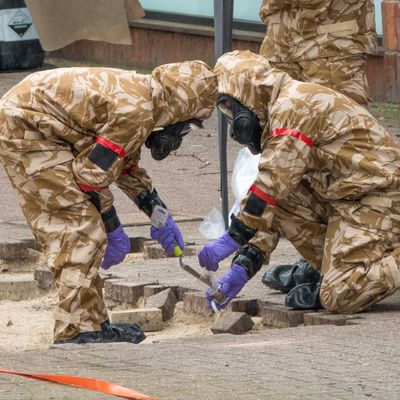
The Trump administration announced on Wednesday that it will impose new sanctions on Russia over the nerve-agent attack on former Russian spy Sergei Skripal and his daughter Yulia in March. Russia is already under U.S. sanctions for its 2014 invasion of Crimea, and the Trump administration expelled 60 Russians from the U.S. and shuttered the Russian consulate in Seattle in response to the failed assassination attempt. (Authorities believe a British woman’s death was caused by accidental exposure to the nerve agent.)
Under the new sanctions, which will take effect in two weeks, requests by American companies to sell Russia items with a potential national-security purpose will be automatically denied, with few exceptions. An administration official said the list of affected items is “enormously elaborate,” but exports to Russia that could have a military purpose were already banned under the Obama administration.
When asked about how the new sanctions jibe with President Trump’s desire to improve relations with Russia, which he made quite clear during last month’s summit with Vladimir Putin in Helsinki, a State Department official said they’re perfectly aligned, as the entire Trump administration is “tough on Russia.”
“This is a question not of Russia policy per se, but of implementing laws that Congress has put in place,” the official said. “This is not about different bits of the administration going in different directions. We are all one administration, and we’re all on the same page here … We are tough on Russia, and at the same time we’re quite committed to working to maintain relations because there are important things at stake here. We work on cooperative things where it is possible to do so, and we cry foul when it’s necessary to do so.”
But the Trump administration actually could have moved more aggressively, and it’s only doing what’s required by law. As Politico notes, in March House Foreign Affairs Committee Chairman Ed Royce formally requested that the Trump administration conduct a probe to determine if Russia should face sanctions over the nerve attack. The Trump administration missed the two-month window to respond, and Royce sent a letter two weeks ago rebuking Trump.
“In recent years, Vladimir Putin has steadily escalated his campaign to consolidate power and undermine the United States,” Royce said in the letter. “Your compliance with the Chemical and Biological Weapons and Warfare Elimination Act of 1991 is critical to showing Putin that we are serious about challenging his deadly acts, as well as his ongoing attacks on our democracy.”
Under the law, once the government determines that a country has used chemical or biological weapons in violation of international law, it must impose sanctions. If Russia does not meet three criteria — ending its use of such weapons, assuring the U.S. that it has no plans to use them again, and offering to let international observers verify that — then there will be a second, harsher round of sanctions in 90 days. That could include the U.S. withdrawing support for international loans and U.S. bank loans, blocking Russian airlines from landing in the U.S., and suspending diplomatic relations.
Experts say Russia is unlikely to meet those requirements, but it’s also hard to imagine the Trump administration cutting diplomatic ties with Russia in three months. As CNN’s Jim Sciutto points out, the timing makes the next deadline even more interesting.






























